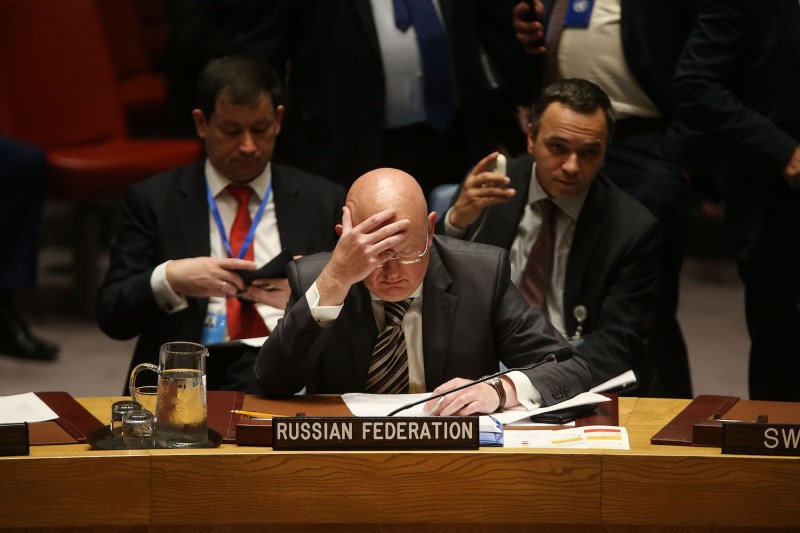Jackal
JF-Expert Member
- Apr 10, 2012
- 9,554
- 12,674
- Congress Wants to Boot Russia From U.N. Security Council
- The Biden administration is also interested in watering down Russia’s influence at the United Nations.
By Jack Detsch, a Pentagon and national security reporter at Foreign Policy., and Amy Mackinnon, a national security and intelligence reporter at Foreign Policy. FP subscribers can now receive alerts when new stories written by these authors are published.

Russia's United Nations ambassador, Vasily Nebenzya, attends a U.N. Security Council meeting where the United Kingdom officially announces the latest findings behind the poisoning of Russian ex-spy Sergei Skripal and his daughter in March in New York City.
Russia's United Nations ambassador, Vasily Nebenzya, attends a U.N. Security Council meeting where the United Kingdom officially announces the latest findings behind the poisoning of Russian ex-spy Sergei Skripal and his daughter in March in New York City on Sept. 6, 2018. Spencer Platt/Getty Images
Two U.S. lawmakers heading up an independent U.S. government human rights watchdog have introduced a resolution that calls on President Joe Biden to boot Russia from the United Nations Security Council, just days before the Kremlin’s flagging full-scale invasion of Ukraine is set to hit its 10-month mark.
The bipartisan Helsinki Commission, which called on U.S. Secretary of State Antony Blinken to protest Russia’s standing as a permanent Security Council member in October, wants Congress to argue that Russia’s war has violated the “purposes and principles of the United Nations” and asks U.S. government agencies to take steps to limit Russia’s privileges at the U.N., though it gives the administration some free rein to determine how it might act.
In the congressional resolution shared with Foreign Policy, Reps. Steve Cohen and Joe Wilson said that Russia had committed “flagrant violations” of the U.N. Charter that call into question its right to hold a Security Council seat, including the illegal annexation vote in four Ukrainian oblasts, the perpetration of atrocities in Ukrainian cities such as Bucha, nuclear saber-rattling, and creating risks to the world’s food supply.
Ukraine has also advocated for Russia to be removed from the council, though experts remain skeptical that such efforts will work. The U.N.’s governing charter doesn’t contain any provisions for removing a permanent member of the Security Council. While countries can be removed from the United Nations altogether, doing so would require a two-thirds majority vote in the General Assembly, including the unanimous consent of the council itself.
“Russia would have to agree to it, and it’s just not going to happen,” said Louis Charbonneau, U.N. director with Human Rights Watch. China is also unlikely to agree to such a precedent.
Though House resolutions are not binding law, the move solidifies thinking both on Capitol Hill and within the Biden administration about how to curb Russian influence in Turtle Bay. The resolution pushes forward a previous effort from the Helsinki Commission—which was created in 1975 as part of a U.S. law that solidified the brief detente between the United States and the Soviet Union—calling on the State Department to initiate a process to strip Russia’s seat on the top U.N. body.
One idea, backed by the commission as well as some legal scholars, seeks to challenge Russia’s status as the heir of the Soviet Union’s seat at the Security Council. As one of the initial signatories of the treaty that founded the Soviet Union, alongside Russia and Belarus, Kyiv could make a convincing claim to be the only successor state of the Soviet Union not to have flagrantly violated the principles of the U.N. Charter and issue credentials for one of its own diplomats to take the seat. As deciding on credentials is a procedural matter, it would only require nine of the 15 members of the council to vote in support of Ukraine, Thomas Grant, a senior research fellow at the University of Cambridge, has argued.
The feasibility of such a plan remains a subject of debate. And three decades after Russia took over the Soviet Union’s seat, challenging such precedent could also prove to be an uphill battle. “You’re looking at three decades of recognition of Russia in this place,” Charbonneau said.
But Russia’s long-standing intransigence, along with the full-scale invasion of Ukraine, has gotten both the United States and Ukraine to begin thinking about alternatives to diminish Moscow’s influence. Speaking at the U.N. General Assembly in September, Biden called for reforms of the Security Council, including the possibility of adding more permanent and nonpermanent members, such as for countries in Africa, Latin America, and the Caribbean. The United States also succeeded on Wednesday in ousting Iran from a United Nations panel on women’s rights.

